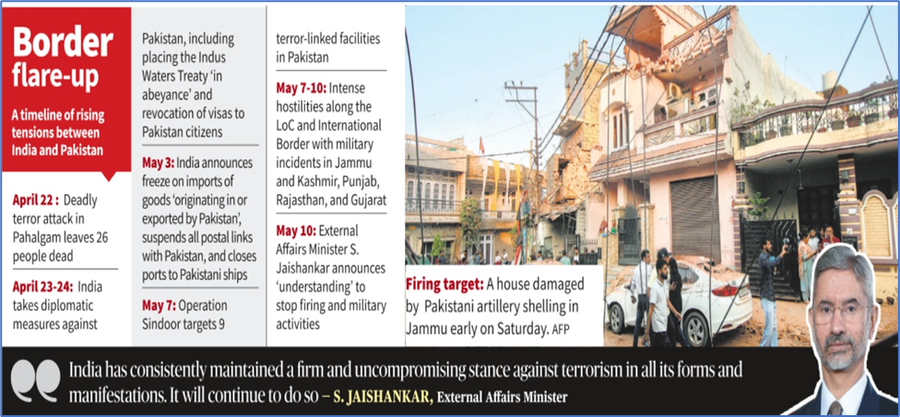Why in News?
Eighteen days after a terror attack in Pahalgam, J&K, triggered an Indian military strike and four days of intense conflict with Pakistan, both nuclear-armed nations agreed to cease hostilities and halt military action from 5 pm on May 10.

What’s in Today’s Article?
- India and Pakistan Agree to Cease Military Action
- End of the Most Intense India-Pakistan Conflict in Decades
India and Pakistan Agree to Cease Military Action
- After three days of intense hostilities, India and Pakistan reached an "understanding" to stop all military action and firing.
- The announcement was made by External Affairs Minister S. Jaishankar on May 10, 2025.
- Ceasefire Bilaterally Agreed, Punitive Measures Unaffected
- Official sources emphasized that the decision was a bilateral agreement, not mediated by any third party.
- India clarified that the ceasefire would not impact the punitive actions taken in response to the April 22 Pahalgam terror attack.
- Role of the United States
- US President Donald Trump claimed credit for brokering the ceasefire after overnight negotiations.
- Secretary of State Marco Rubio and Vice President JD Vance engaged with senior Indian and Pakistani leaders.
- Rubio said both nations agreed to begin broader talks at a neutral venue, a claim India later refuted.
- Despite US claims, Indian officials emphasized that the ceasefire was a bilateral understanding with no foreign mediation, consistent with the 1972 Simla Agreement.
End of the Most Intense India-Pakistan Conflict in Decades
- The recent India-Pakistan military confrontation, the most intense in 20 years, has concluded.
- However, the nature of engagement between the two countries has shifted significantly.
- India Redefines Terms of Engagement
- Since 2014, India has moved to dismantle the framework that allowed Pakistan to exploit nuclear deterrence and cross-border terrorism.
- Key steps include:
- Crossing the LoC post-Uri (2016)
- Striking deep into Pakistan during Balakot (2019)
- Revoking J&K’s special status
- Attacking terror camps in West Punjab (2025)
- Suspending the Indus Waters Treaty
- Delhi Signals No More Restraint
- The suspension of the Indus Waters Treaty and deep strikes inside Pakistan mark a new posture: India is prepared to hit core areas if provoked by terror.
- Talks, if they occur, will likely include demands to renegotiate the Indus treaty and revise the engagement framework set during India’s weaker 1990s phase.
- Third-Party Mediation Diminished but Still Present
- Although U.S. initially adopted a hands-off approach, it re-engaged as hostilities escalated.
- U.S. National Security Adviser Marco Rubio facilitated calls between Delhi and Rawalpindi.
- Still, India and Pakistan demonstrated the ability to manage escalation directly — a shift from the heavily mediated past.
- History of Missed Diplomatic Opportunities
- Past ceasefires and backchannel negotiations (e.g., 2004–2007, 2021) have failed due to political instability in Pakistan and internal military-civilian rifts.
- The rise of Gen. Asim Munir in 2022 hardened Pakistan’s stance and derailed earlier initiatives.
- Need for Defence Reform and Strategic Military Edge
- India’s broader national power has increased, but military superiority over Pakistan remains limited.
- Achieving operational dominance is crucial for treating terrorism as an "act of war" and deterring future provocations.
- Engagement Beyond the Pakistan Army
- India may need to build links with Pakistani civil society and political elements to reduce military dominance and promote peace.
- Large conflicts often cause internal shifts in Pakistan — whether this latest one weakens or strengthens Gen. Munir’s grip is still unclear.
- A Wake-Up Call for Both Nations
- For the first time in years, Indian cities experienced the consequences of modern warfare, including drone strikes and long-range attacks.
- The trauma of urban warfare could prompt reflection on the long-troubled state of India-Pakistan relations, even after 75+ years of independence.









